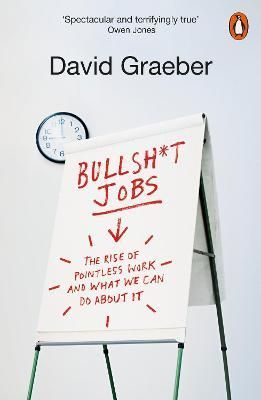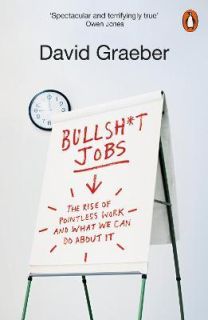In the early twentieth century, people prophesied that technology would see us all working fifteen-hour weeks and driving flying cars. Instead, something curious happened. Not only have the flying cars not materialised, but average working hours have increased rather than decreased. And now, across the developed world, three-quarters of all jobs are in services, finance or admin: jobs that don't seem to contribute anything to society. In Bullshit Jobs, David Graeber explores how this phenomenon - one more associated with the Soviet Union, but which capitalism was supposed to eliminate - has happened. In doing so, he looks at how, rather than producing anything, work has become an end in itself; the way such work maintains the current broken system of finance capital; and, finally, how we can get out of it.
This book is for anyone whose heart has sunk at the sight of a whiteboard, who believes 'workshops' should only be for making things, or who just suspects that there might be a better way to run our world.
Terms & Conditions
Terms of Use briefly
You can find a book that interests you browsing the categories or using the search engine.
Site registration is not mandatory.
The delivery cost to Bulgaria is fixed and does not depend on the number and weight of the books ordered - 5.90 lv for a courier delivery and 4.90 lv to Econt office. Orders over 42.00 lv are delivered for free if the order is dispatched at once. In cases where the order is over 42.00 lv and part of the books are with 30 or 60-day-delilvery term, then the free delivery is applied to the books in stock, and the rest is dispatched with the usual price - 5.90 lv for a courier delivery and 4.90 lv to Econt office. If the customer wants to have all the books dispatched together, then they should request that in the Special Instructions field.
Usual delivery time - 2-3 working days for items in stock.
- for individual orders - 20 days for English titles and 25 days for German titles.
Prolonged delivery time - rarely needed up to 20 days for delivery of books available online and up to two months for individual orders. In these cases the customer is promptly informed about the changes in the delivery time.
We accept payment by cash - paid to the courier upon receipt of the books and bank transfer.
Please contact us for further details if you wish to pay with a bank tansfer.
The amount you pay is equal to the price of the ordered goods with delivery costs. This amount represents an advance in the sense of Art. 53, par. 1 of the Law on Consumer Protection, for which you give consent by clicking the "Finalize order" button.
Returns
You may return your order within 14 days from the day of purchase, under the following conditions:
1. The book is intact, without injuries, scratches or external damage;
2. There are no torn pages;
3. There are no damages caused by the customer due to careless transportation or misuse;
4. Where there are supplies or accessories included, they are intact in their original packaging;
5. The transportation costs for the return of the order are covered by the customer.
















